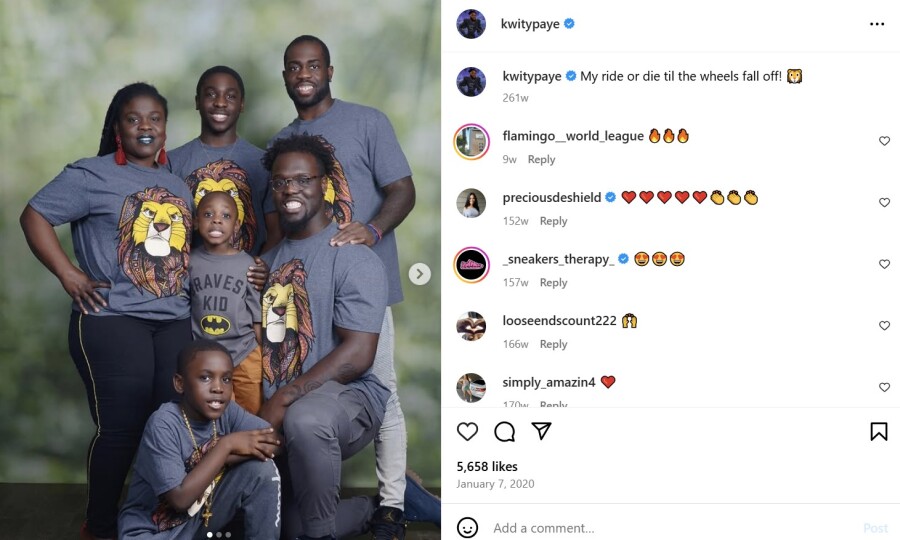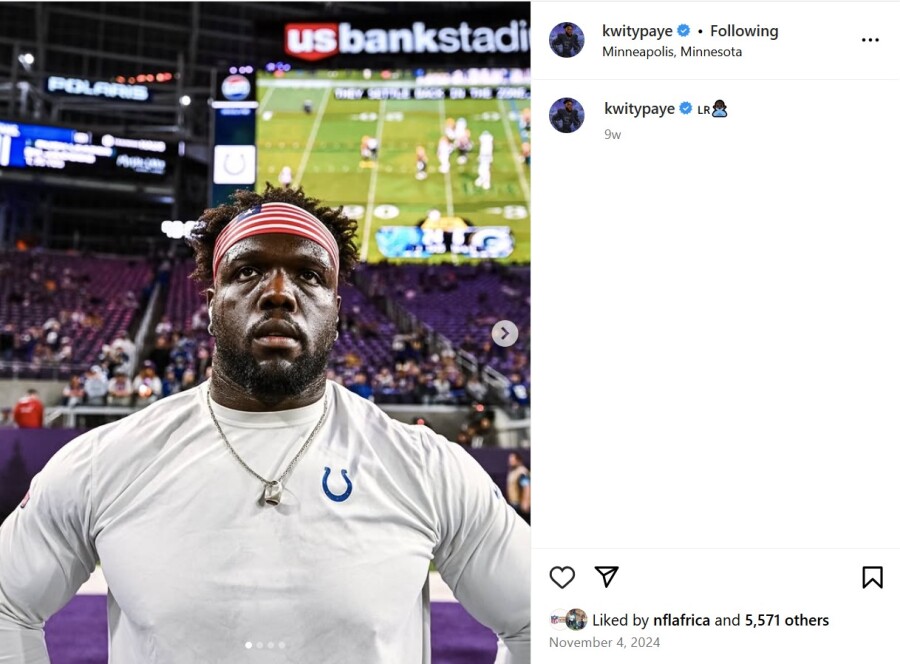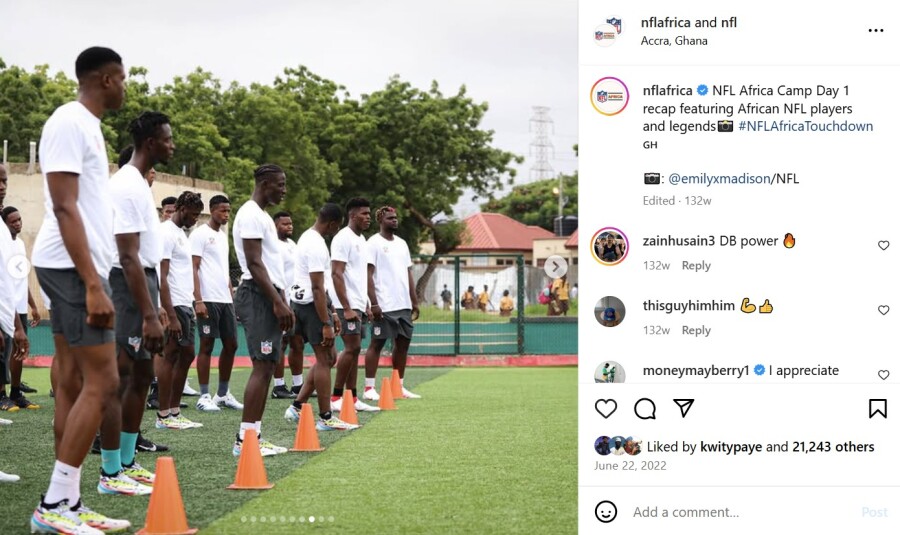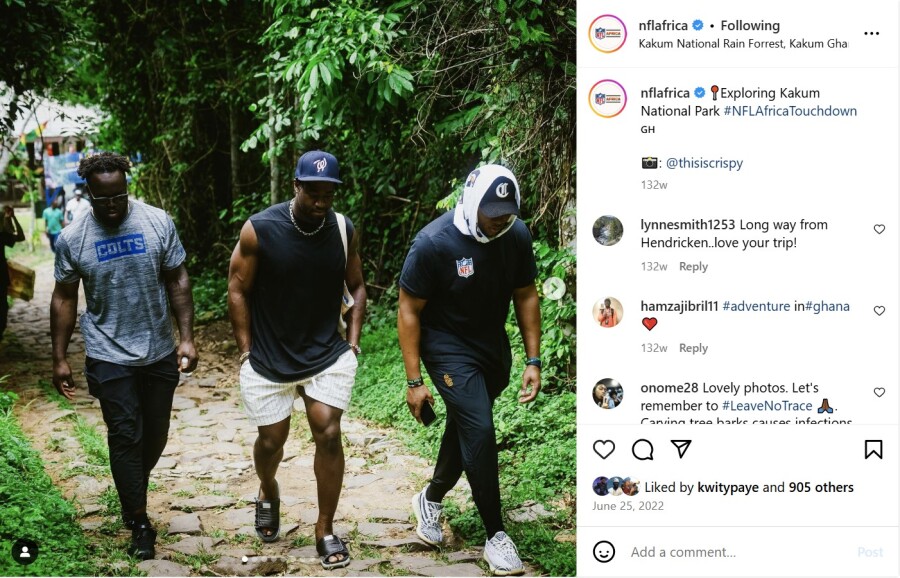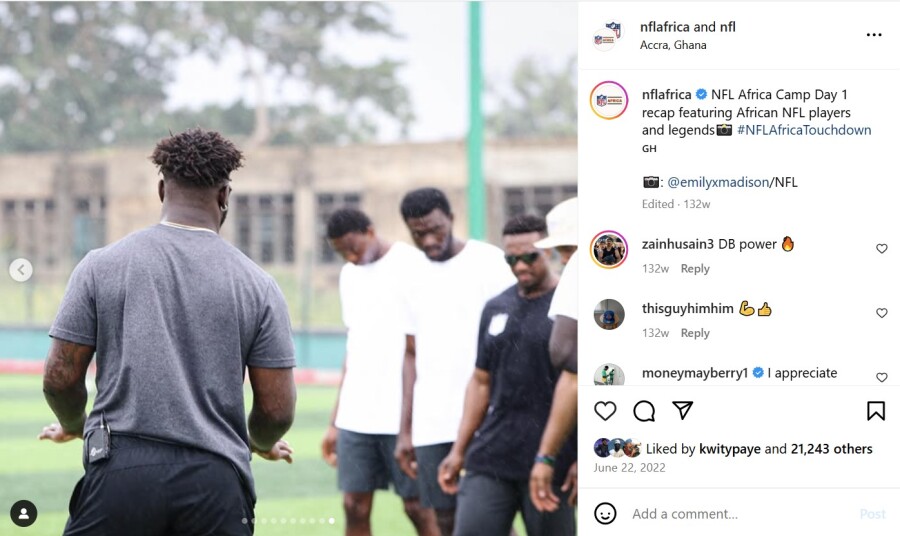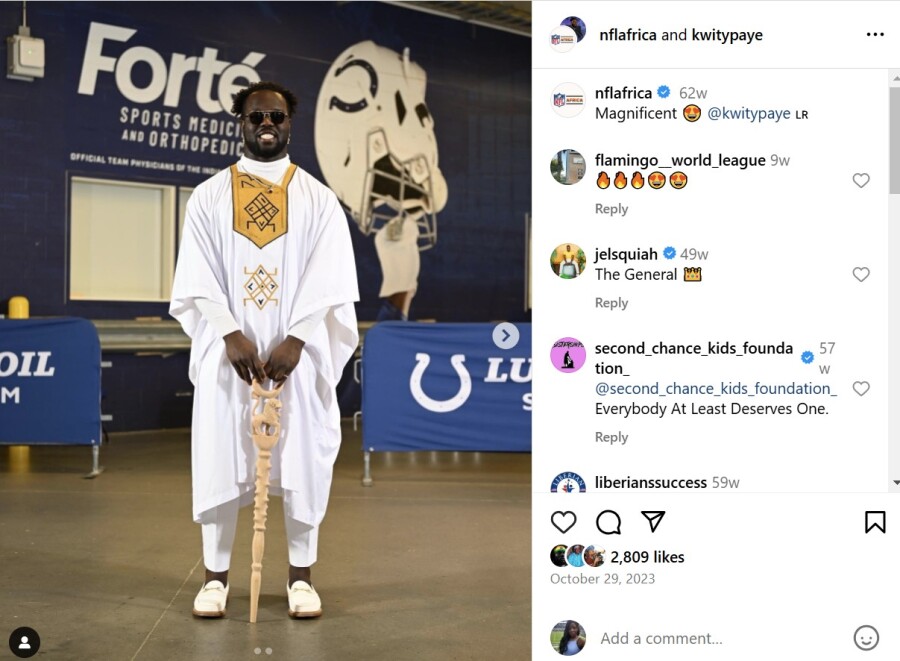“Please, please! I have to go. This is the only way.”
This was a 12-year-old Kwity Paye to his mother Agnes, pleading to attend Bishop Hendricken, a private high school in Warwick, Rhode Island, believing it would get him one step closer to playing in the NFL — a dream that, at the time, seemed far-fetched for a kid who was born in a refugee camp in Guinea and moved to Providence when he was six months old.
The tuition was around $10,000 — half of Agnes’ salary — but persuaded by Kwity’s promise to earn a full scholarship to college, she agreed.
Agnes, who fled Liberia during the first Liberian Civil War, seeking refuge in Sierra Leone and Guinea, worked three jobs to support her son’s dream. In return, Kwity, who just wrapped up his fourth NFL season with the Indianapolis Colts, has ensured the fruits of her labor have multiplied.
He’s changed his family’s life — and now, he’s made it his mission to uplift the nation of Liberia.
In the conversation below, part of NBC Sports’ By Way of Africa series, the former Michigan Wolverine and the 21st overall pick in the 2021 NFL Draft, discusses his remarkable journey to the NFL and passion for his Liberian culture.
*This interview has been edited for length and clarity.
Your first name has a powerful meaning. Can you share the story behind it?
Kwity Paye: I’m named after my grandfather on my mom’s side. There was a period of time in Liberia when people would travel from the city to the countryside and the villages, then bring those people into the city to make them people of “Kwi”.
We hold people of Kwi to a high standard. We refer to presidents and leaders as people of Kwi, and the direct translation is “because of civilization”. So, they bring them to the city side, make them civilized in a way, and then send them back to their people so they can uplift their communities and help everyone.
In the past, you’ve mentioned taking on the responsibility of your name. Can you elaborate on that a little bit?
Paye: I want to represent Liberia everywhere I can. Whether it’s wearing Liberian [attire] to the games, I want to represent my people as much as I can. I just try to make sure Liberia is in the spotlight. I want to [be able] to go back and help my people.
My mom is in Liberia right now, and I dream of going back to build schools, [improve] the ones that are already there, help build hospitals, and create roads.
You’ve been open about your mom’s journey fleeing Liberia during the civil war. Has she shared anything from that time with you that has resonated with you? How has learning about your family’s history and what she lived through impacted you?
Paye: My favorite African proverb is: “To the patient man will come all the riches of the world.” At the time, my mom didn’t know that she would be where she is now. She’s retired, and her son is in the NFL. I’m very proud to take care of her and make sure she has everything that she needs.
But during the war, she didn’t know that she was even going to make it out alive. She had two boys during the very gruesome civil war and watched plenty of her family members get murdered. We’re just blessed to be where we are, and I’m so grateful for her.
I’m really proud when I talk about my mom because I think she’s the strongest person in the world. She’s my hero. Anytime anyone talks about Agnes, I always make sure to put her in the highest [regard].
You’ve been open about what the environment was like growing up when your family moved to the south side of Providence, Rhode Island. Was there a specific moment when you realized that things needed to change?
Paye: There was a time when all of my cousins would come to my house. Me, my older brother, and all of my cousins would just mess around the house or go outside and play football.
One particular night, we wanted to go run routes around 10 PM. We were walking down the street when this car pulled up, rolled it’s tinted windows down, and said, “Hey you guys can’t be on the street. We’re about to start shooting.”
We all ran back inside, and later that night, you could hear the car screeching down the roads and gunshots going off.
That was my first experience of gang violence. From that moment, I was shaken, and I knew I had to get my family out of this environment.
A bunch of my kids from city went to school [locally], but I knew if I wanted to go to college, I had to take a different route. That’s what led me to the private school that I went to.
My mom ended up working three jobs, often overtime, sometimes sleeping at work, just to make sure that she’d be able to cover my tuition, bus fees, and take care of five boys, all by herself.
Was football always something you saw as your ticket out, or did you consider other options?
Paye: With football, I was so gifted [athletically] that I knew I could take it somewhere. Even when I went to college, I never thought I was going to go the NFL because it was so far-fetched. They always show the numbers — how many high school football players there are in the country, then they show the number of DI athletes, how many people actually get drafted, and then how many actually stay in the league.
I’m an immigrant from Liberia and Rhode Island—the smallest state in the [U.S.]. There’s no way I thought I’d be able to make it to the NFL, let alone in the first round, or end up where I am now, beating the odds.
I really wanted to join the police force, but then I started playing well at Michigan. Scouts started coming around and I knew there was a possibility for me to play in the NFL.
For those who aren’t familiar with your story, you made a promise to your mom that if she let you go to Bishop Hendricken High School — a school that she couldn’t afford — you would earn a scholarship to college.
You kept your end of the bargain and then some. You earned that full ride to Michigan, made it to the NFL, and even bought your mom a house. What does it mean to you to have accomplished this?
Paye: I have a very vivid memory of that day. I was 12 years old. There were two high schools that I applied to. Classical High School was a really good school, but it was in Providence, Rhode Island, and I think their sports were D2 [at the time]. Henrdricken was the school I wanted to go to because my mentor, Will Blackmon, went there. He went to Boston College and then made it to the NFL. I thought, that if I wanted to make it to the NFL, I had to follow that path, so I had to go to Hendricken.
I remember pleading with my mom, “Please, please! I have to go. This is the only way.”
It was tough because the [tuition] was around $10,000, and she only made about $20,000 a year so that was half of her salary.
Looking back, she had a lot of trust in a 12-year-old kid. At the school, I was around a lot of privileged kids whose parents had a lot of money. I saw how some of them handled it, and I just knew I couldn’t waste this opportunity.
I took everything I did seriously — whether it was grades, athletics, or any aspect of life. I knew I couldn’t waste the opportunity and that I had to fulfill my promise to my mom.
Once I got the D1 scholarship, that was just one part of the promise. When I signed my National Letter of Intent, I made another promise. I told my mom, “I promise you’ll never have to work again. Once I’m done doing what I have to do, I’ll make sure you’ll be retired.”
Wanting to change your environment and improve your family’s life is a powerful motivator, but what keeps you going once you’ve achieved that? What is your ‘why’ now, and what continues to drive you?
Paye: I think it’s still unfinished business. I’m taking care of my mom now, but now I feel that to [truly] fulfill my name “Kwi”, I have to go back to Liberia and accomplish what I’ve always wanted to do.
My mom has big plans, and I have to go back to my village and help my Krahn people. There’s more to the story that I need to complete. I’ve done a lot of community work so far, but in the bigger scheme of things, I want to go back and really help my country.
Your Instagram bio even says “Son of Liberia”. Why do you embrace this responsibility, and why does it mean so much for you to go back and give back?
Paye: I love all of my West African countries, but I feel like there aren’t as many Liberian people in the spotlight. I like to really show people where I’m from and shed light on Liberian culture. We’re all proud people. When I went to Minnesota, I noticed there are a lot of Liberians there, and I remember the first time I played there, some of them told me they’ve been watching me play.
I tend to get [frustrated] when I find out someone is African and hasn’t been repping it. You have to make sure you tell people who you are and where you’re from — make sure the culture lives. We’re grateful to be in America, but we can’t forget where we come from. We can’t lose the culture. That’s big for me.
The NFL is working to make sure the culture lives through the work of NFL Africa. In 2022, you had the opportunity to go to Ghana for the very first NFL Africa camp. Can you talk about that experience and how it impacted you?
Paye: It was such a heartwarming experience. It was cool to see the opportunity that we were giving the kids, but then you also got to see where they’re coming from — the real struggle. From my standpoint, I wanted to make it out, but I was already in a better situation in Rhode Island compared to what they were [facing].
For them, it was really do-or-die. They had to create opportunities. It’s amazing that [the camp] was able to bring some of them to America, and now some are even on football teams. There’s also the NFL Academy in the UK. It’s just amazing what NFL Africa is doing right now, and I’m so proud to see it.
It was just such a nice experience. We sat with them, ate with them, spoke with them, followed them on Instagram, and we’re still in contact.
Another opportunity you had on that trip was visiting the Cape Coast Slave Castle, where you saw the inside of the slave dungeons, touched the walls, and walked the floors where the pain and suffering of countless individuals are forever etched. What did that experience mean to you, and how has it affected the way you use your platform moving forward?
Paye: I was just teary-eyed throughout the whole tour. Honestly, just walking through the dungeons and envisioning what our people had to go through, I was extremely sad. But at the same time, I was extremely grateful to be where we are today and to acknowledge the suffering that our people [endured] for us to get here. Any opportunity we have, we can’t waste.
Was that your first trip back to Africa?
Paye: It was my first trip to West Africa, and I haven’t been back since, but I want to go back this offseason. When I was in college, I went to South Africa.
What’s one thing from your Liberian heritage that you’re most proud of?
Paye: I’d probably say it’s how parents really pour everything that they can into their children because they truly want their kids to be better than they are. I think that’s a [common trait] in all African cultures — parents suffer so that the kids don’t have to.
I’m extremely grateful that I’m proud of our culture and to have that background. You can’t fail when you have a support group like that.
When you stop and think about your journey, and the fact that anything could have happened — one small thing — and your entire life could have been completely different, what does that mean to you?
Paye: I heard a sermon not too long ago where the preacher was saying that nothing just happens. I feel like God was watching throughout the whole journey, because if you look at the odds, I was born in a refugee camp during a very gruesome civil war. I ended up coming to Rhode Island, the smallest state, and then being able to come up — the odds of being a D1 athlete from Rhode Island and being a first-round pick — are slim to none.
So, for me to get here, it’s all God. All praise to God and what he’s been able to do in my life. I’m so grateful that I was raised in the Providence Church of Christ.
My aunt texts me Bible verses every morning to make sure I stay grounded and always prayed up. So I give thanks to God, because without him, nothing would be possible.
If you could bottle up one aspect of Liberian culture to share with the world — people who’ve never experienced it — what would it be?
Paye: I’d probably say July 26, which is our Independence Day. It’s the most fun day ever and I haven’t been able to celebrate it [lately] because we have camp around that time. But when I was younger, we would go to this big field for a huge Liberian festival with the food, music, and dancing. It’s crazy because we’re such a welcoming people, you’ll see a random White or [Hispanic] person in there. We just want everyone to [experience] our culture. July 26 is the best day ever.
What are some ways you’ve shared your culture with your teammates?
Paye: I brought them food. My mom came for Thanksgiving last year, and instead of Turkey and traditional Thanksgiving dishes, we had Jollof rice, rice bread, kala, plantains, and a whole bunch of African food. I made a bunch of plates for my teammates and brought them in.
Alright, it’s time for our lightning round! Afrobeats or Amapiano?
Paye: Afrobeats.
Name your top 3 Afrobeats artists of all time.
Paye: Asake, I’ve been playing a lot of Pheelz lately, and then BNXN (formerly Buju).
If you could choose just one traditional Liberian dish to eat for the rest of your life, what would it be?
Paye: Cassava leaf and white rice.
What Afrobeats song have you had on repeat lately?
Paye: “MMS” by Asake and Wizkid.
If you could make one meal to give people to experience for the first time, what would it be?
Paye: I feel like everyone wants to try Jollof rice, so I’d go with fufu and pepper soup.
Editor’s Note: By Way of Africa is a series committed to highlighting the talent and stories from the African continent and its diaspora. African stories are worth telling, and the culture—all of the languages, tribes, and traditions—is worth celebrating. Embedded in these narratives is a profound testament to the diligence, discipline, and work ethic deeply ingrained in African heritage. Whether born on the continent or dispersed across the globe, the contributions of these stories to society resound uniquely, by way of Africa.









